General Sir John Monash, Personal Files Book 17, 11 February - 18 March 1918, Part 11
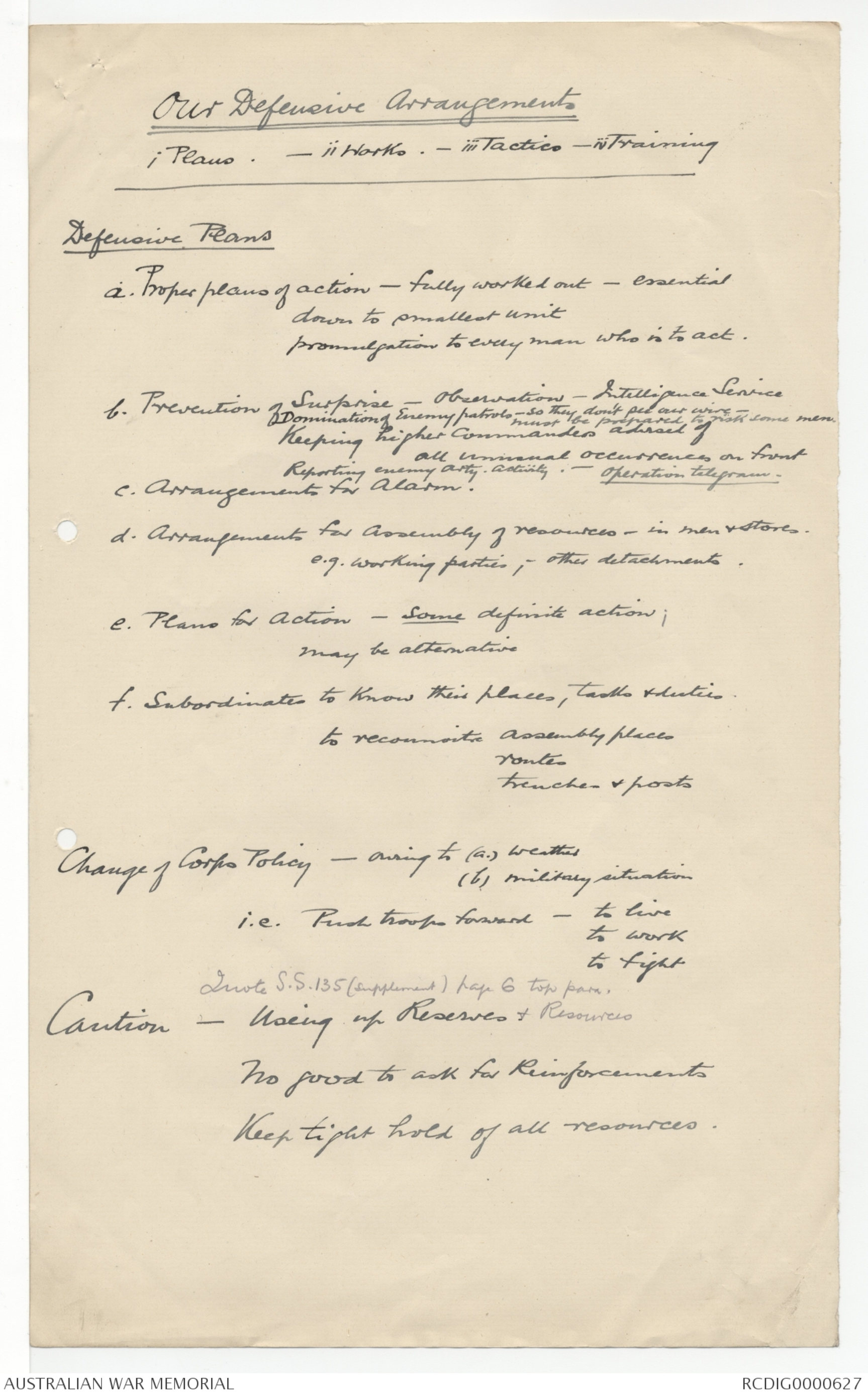
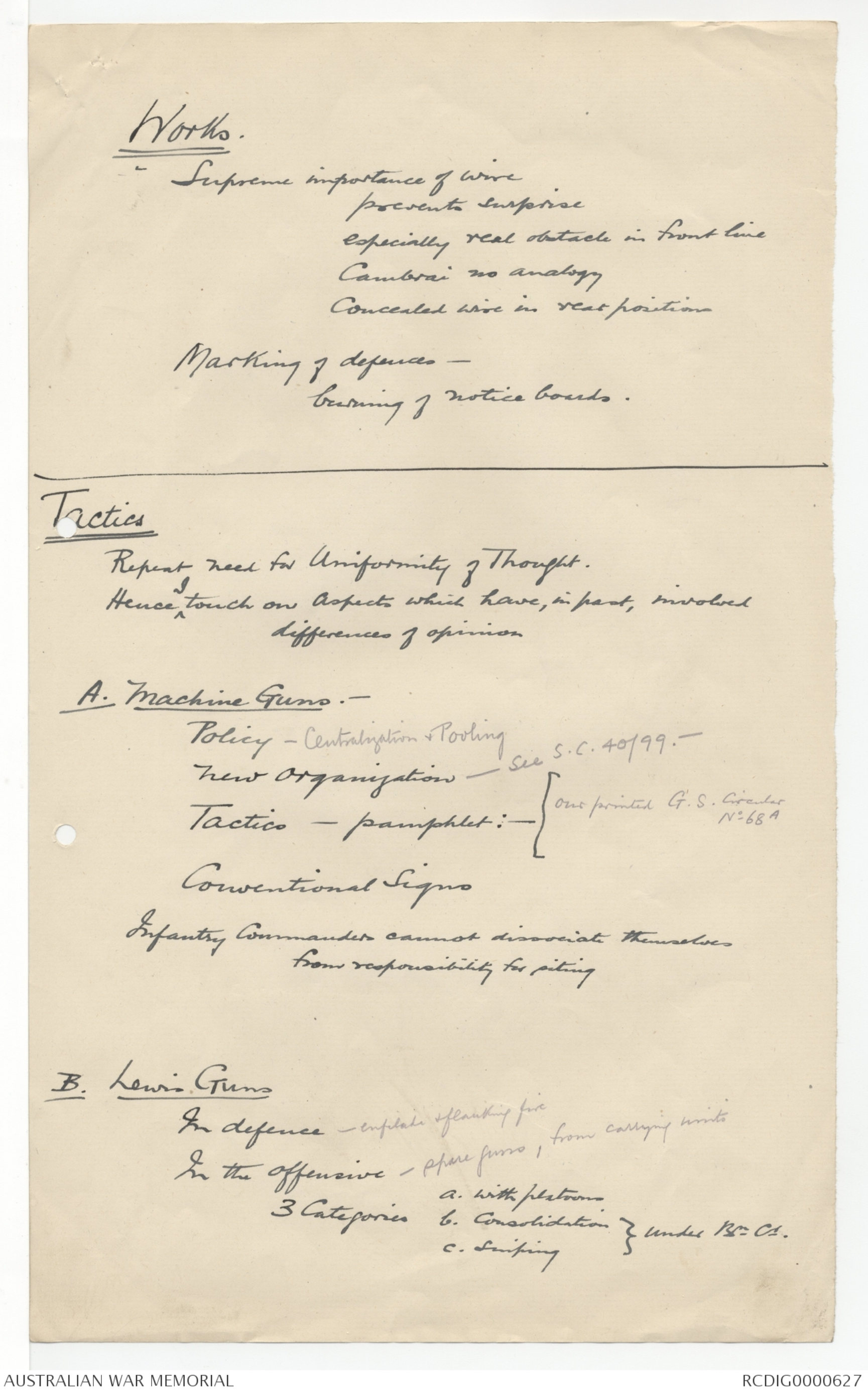
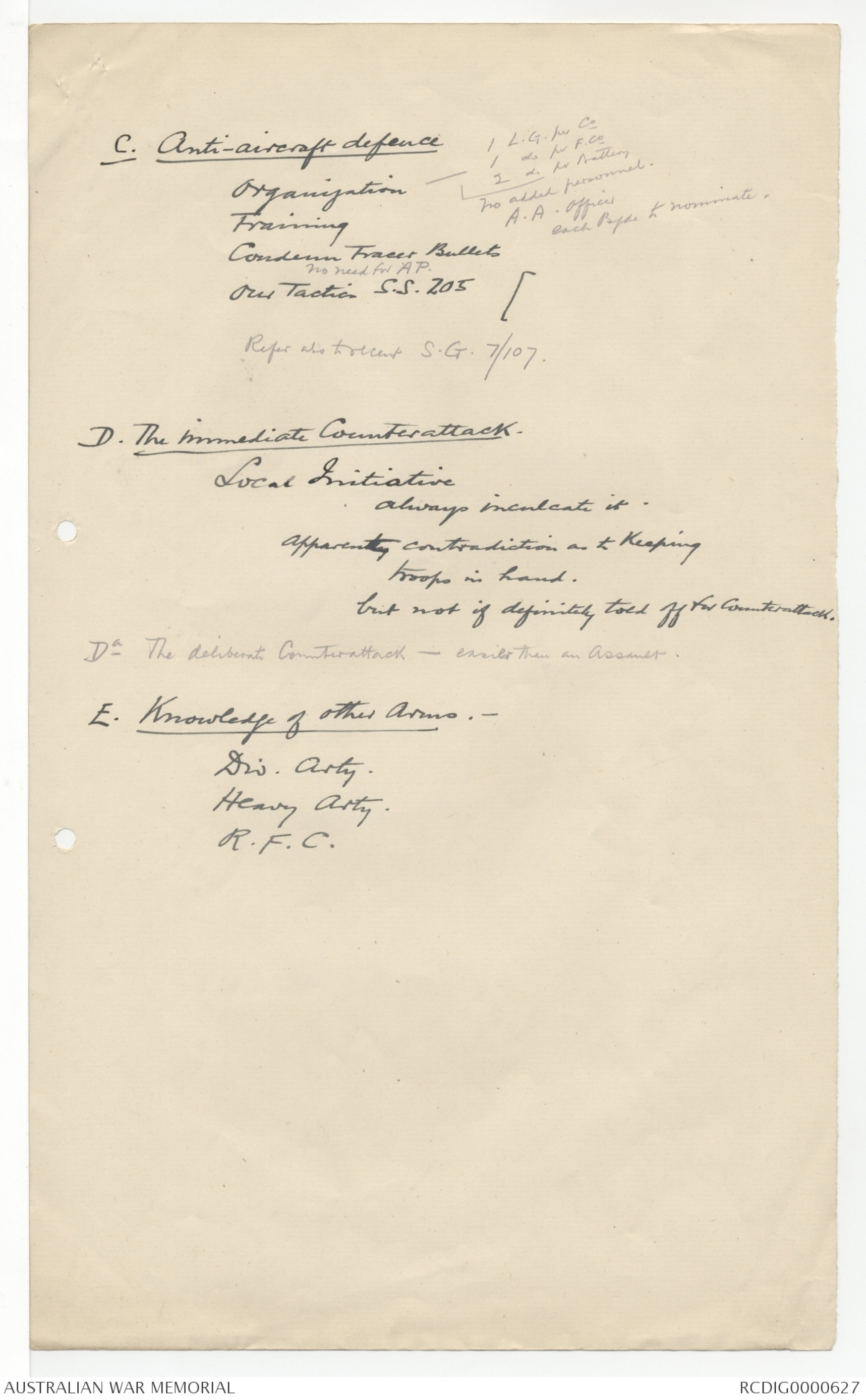
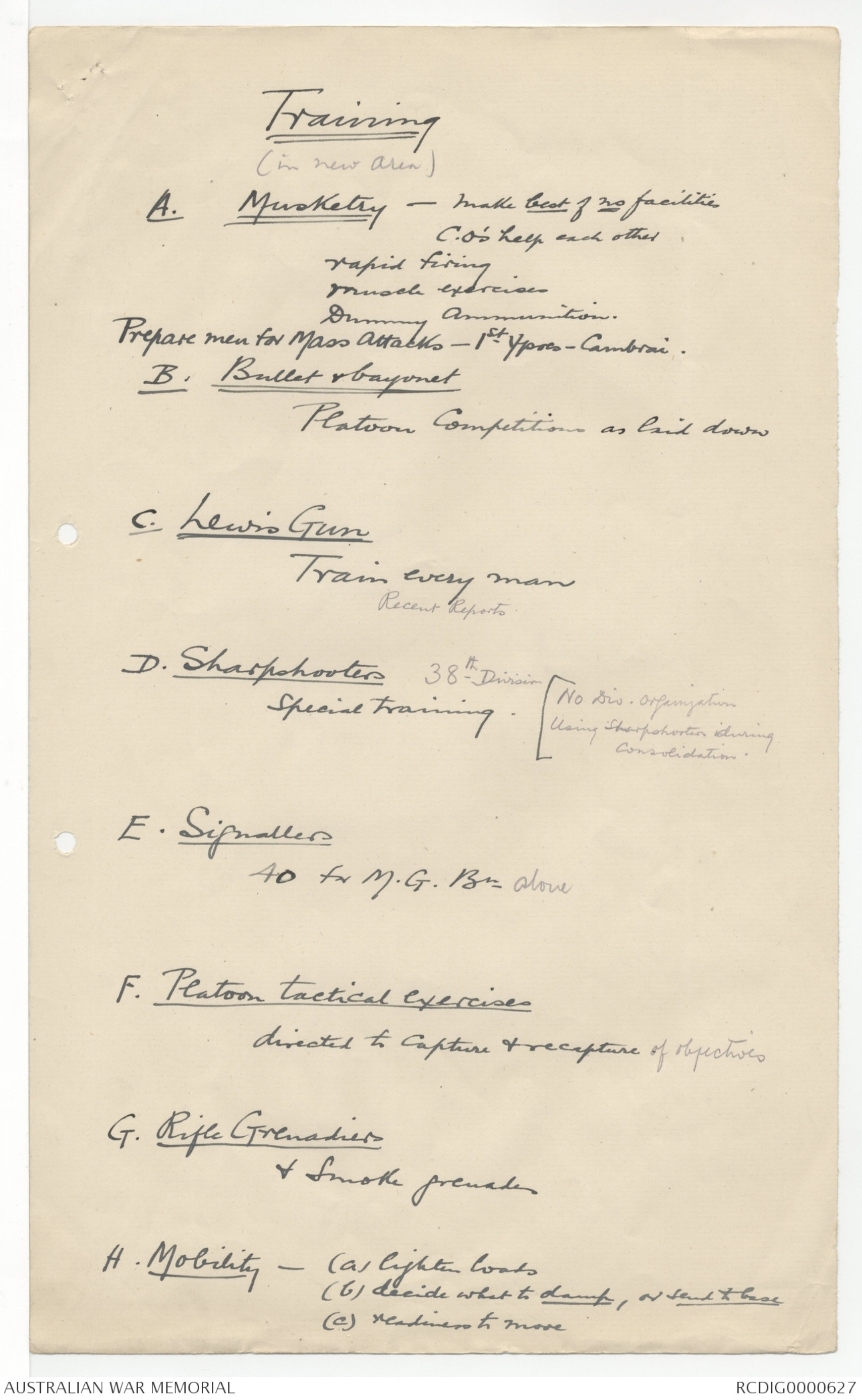
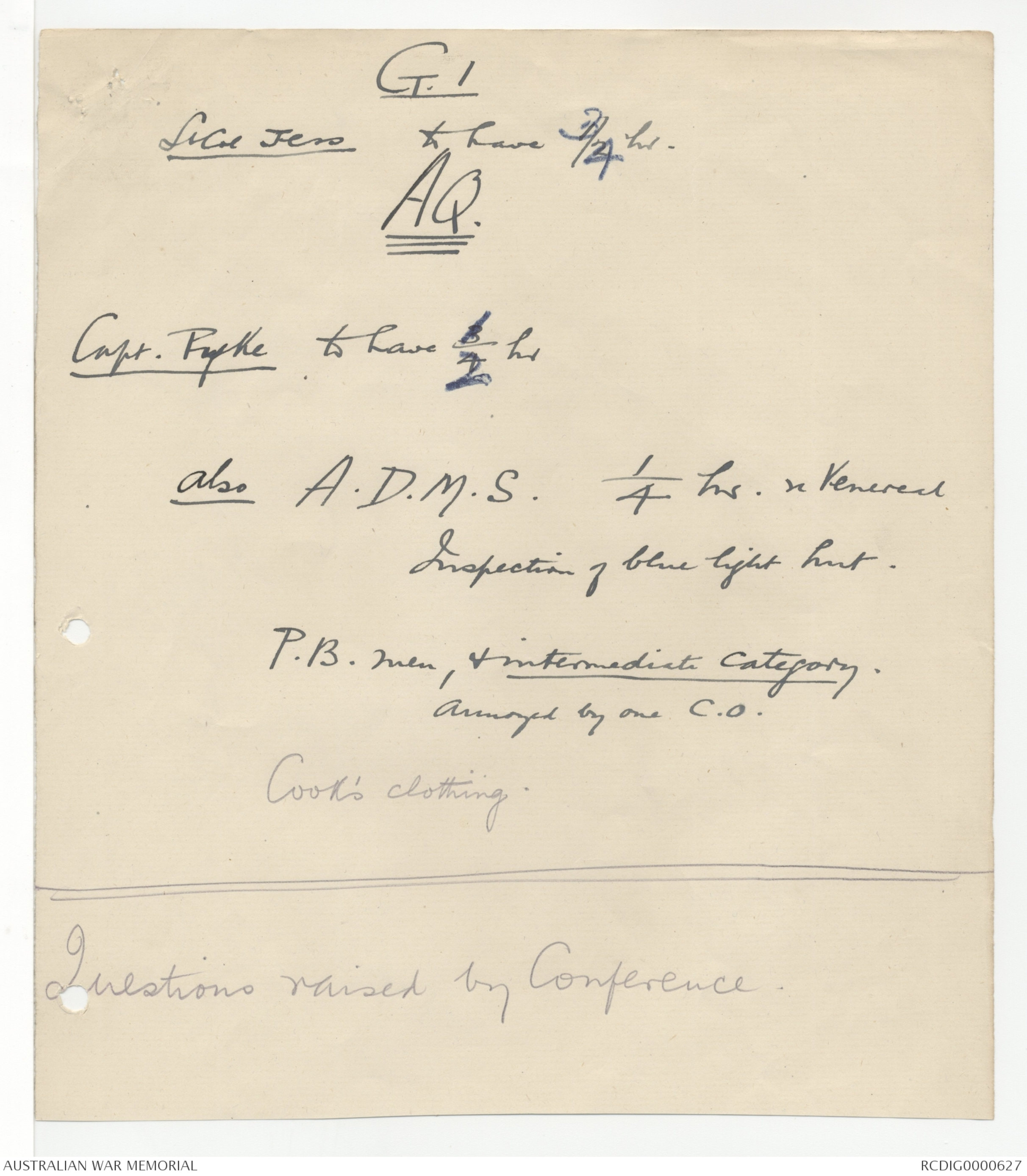
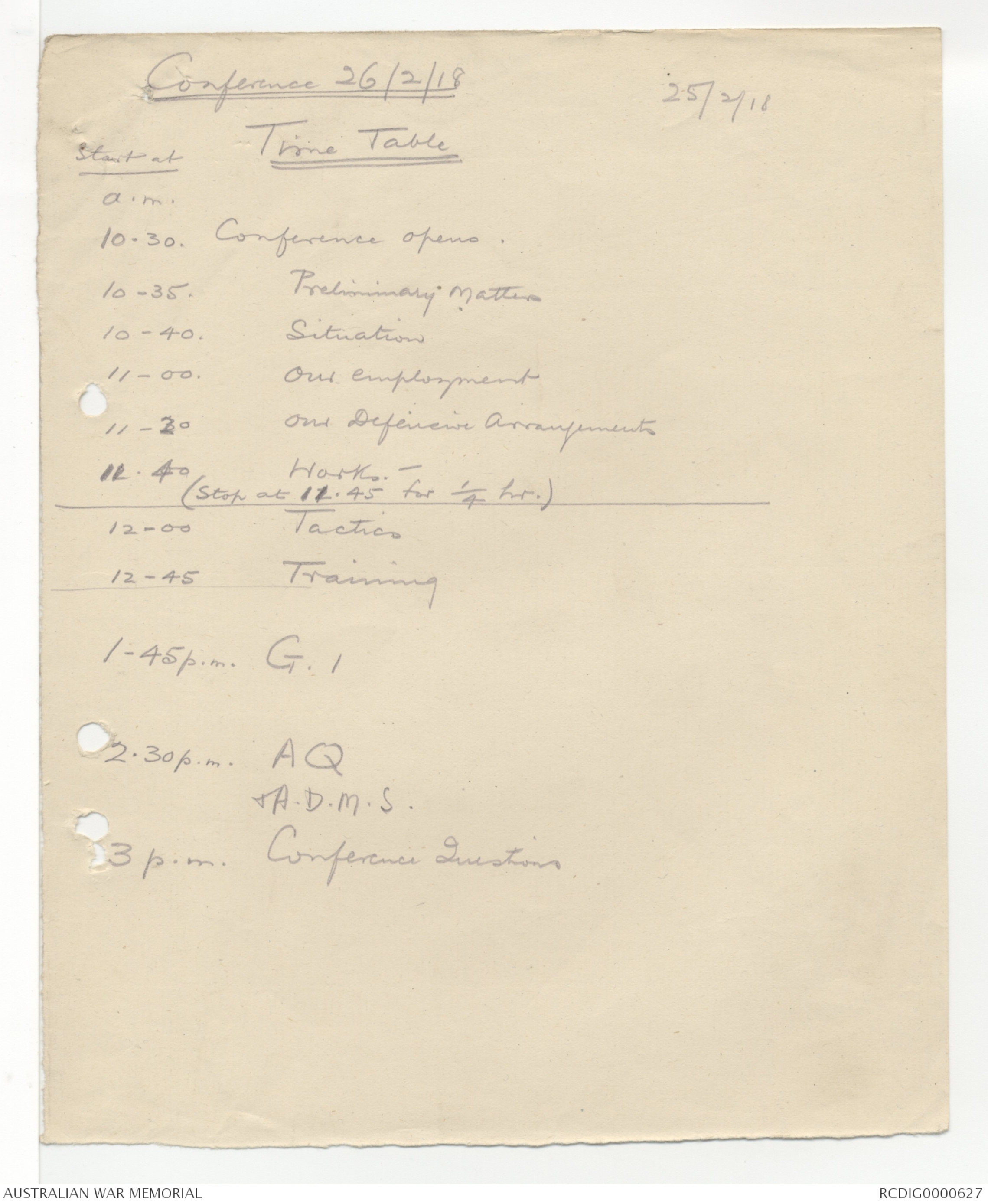
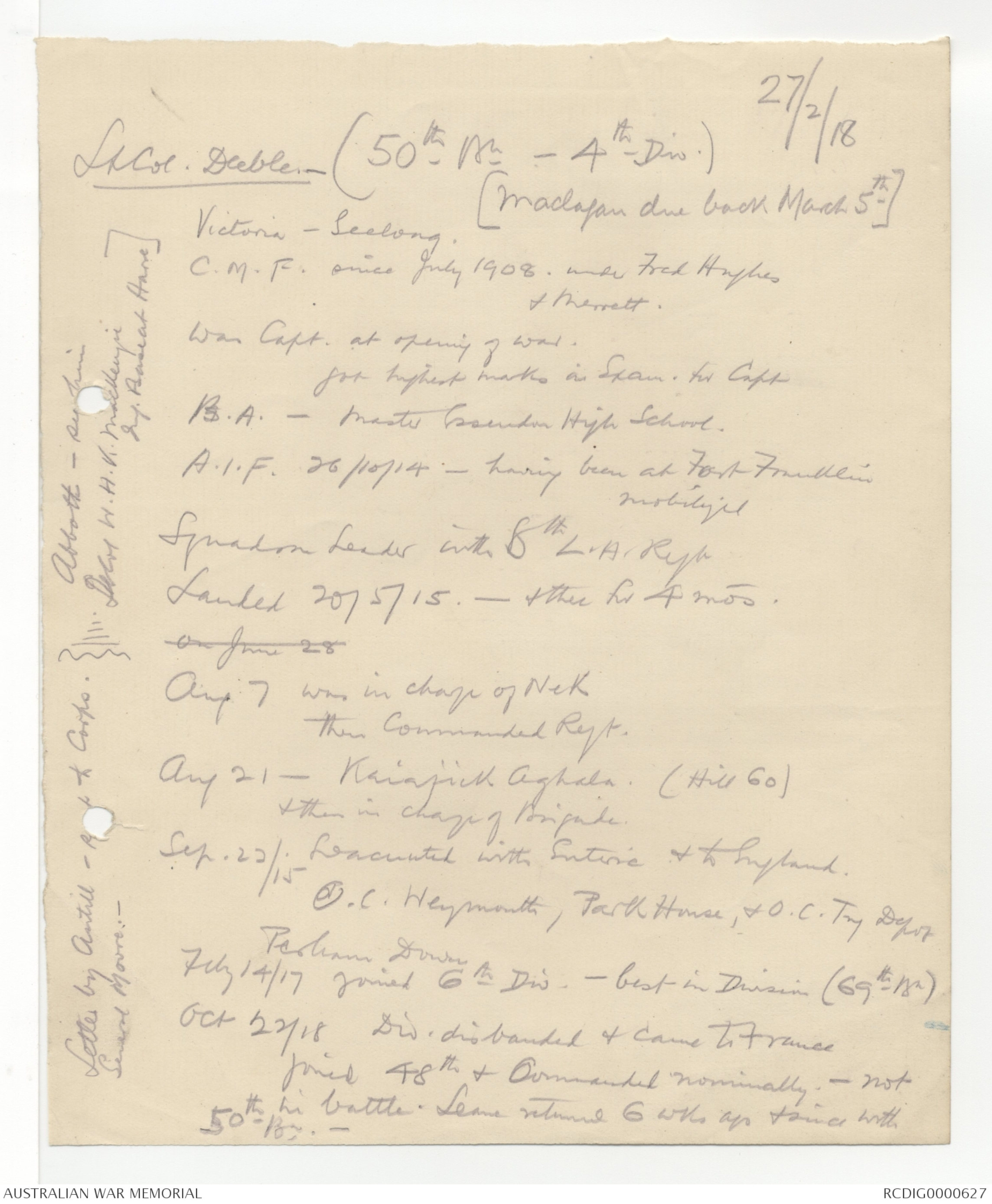
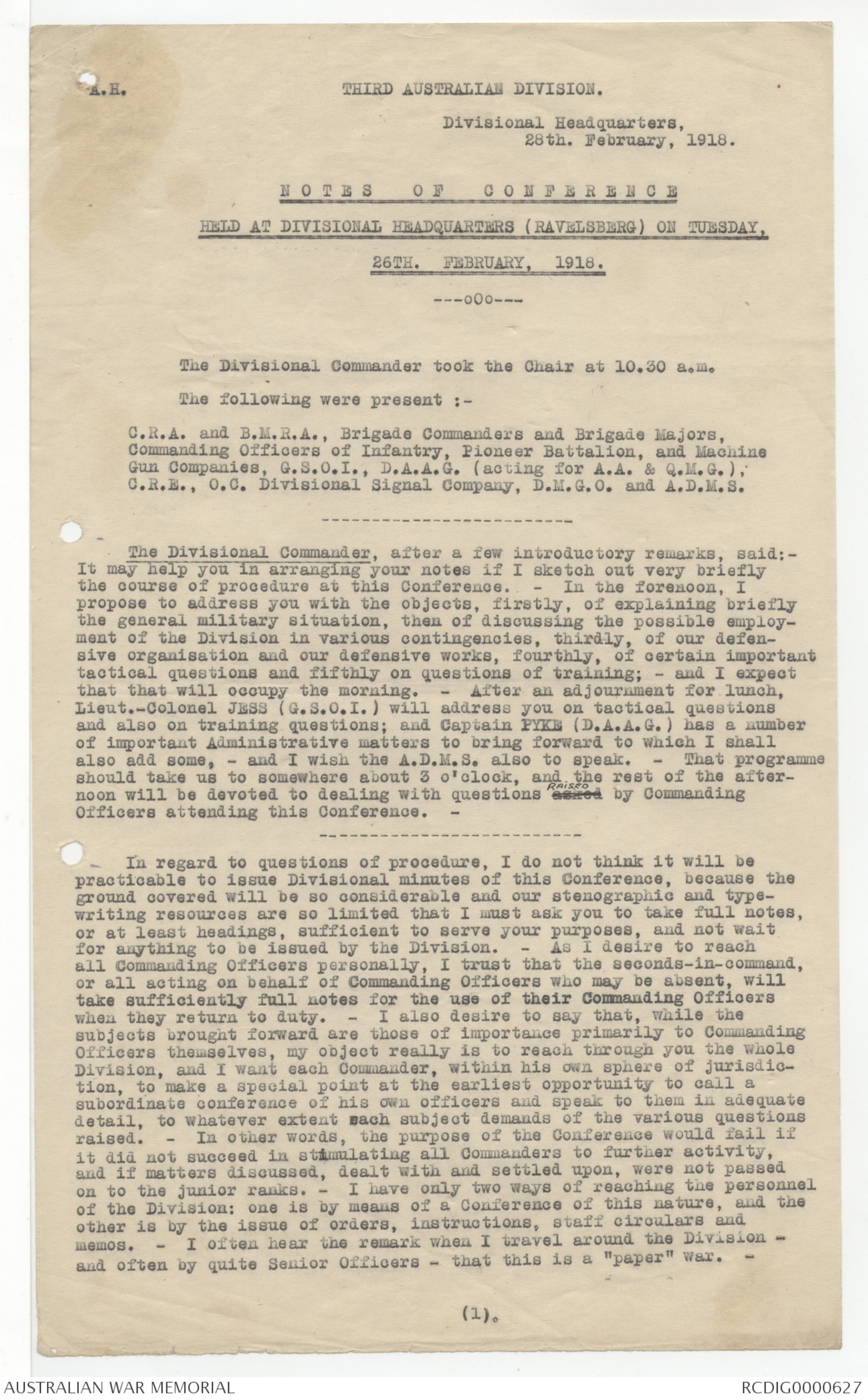
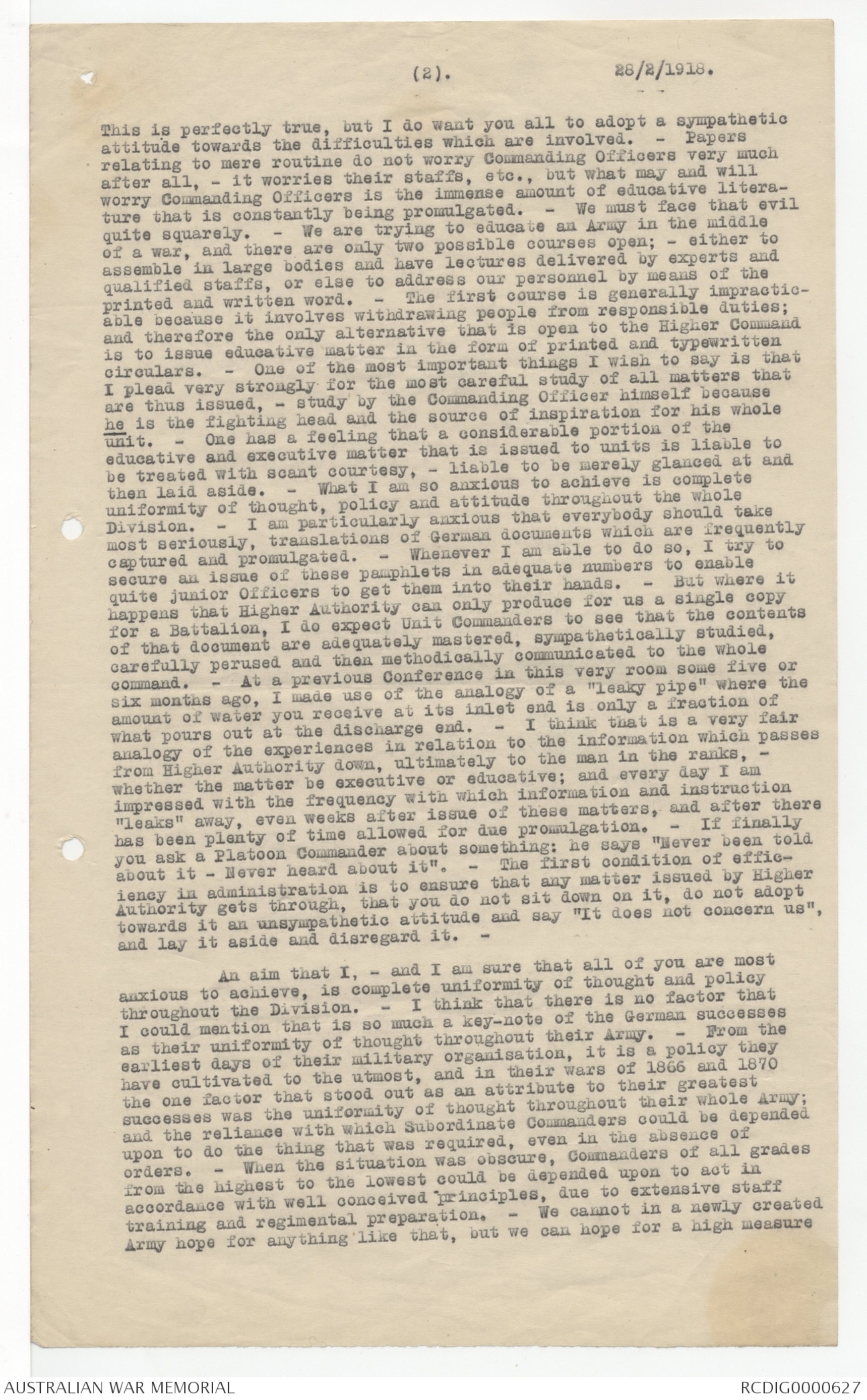
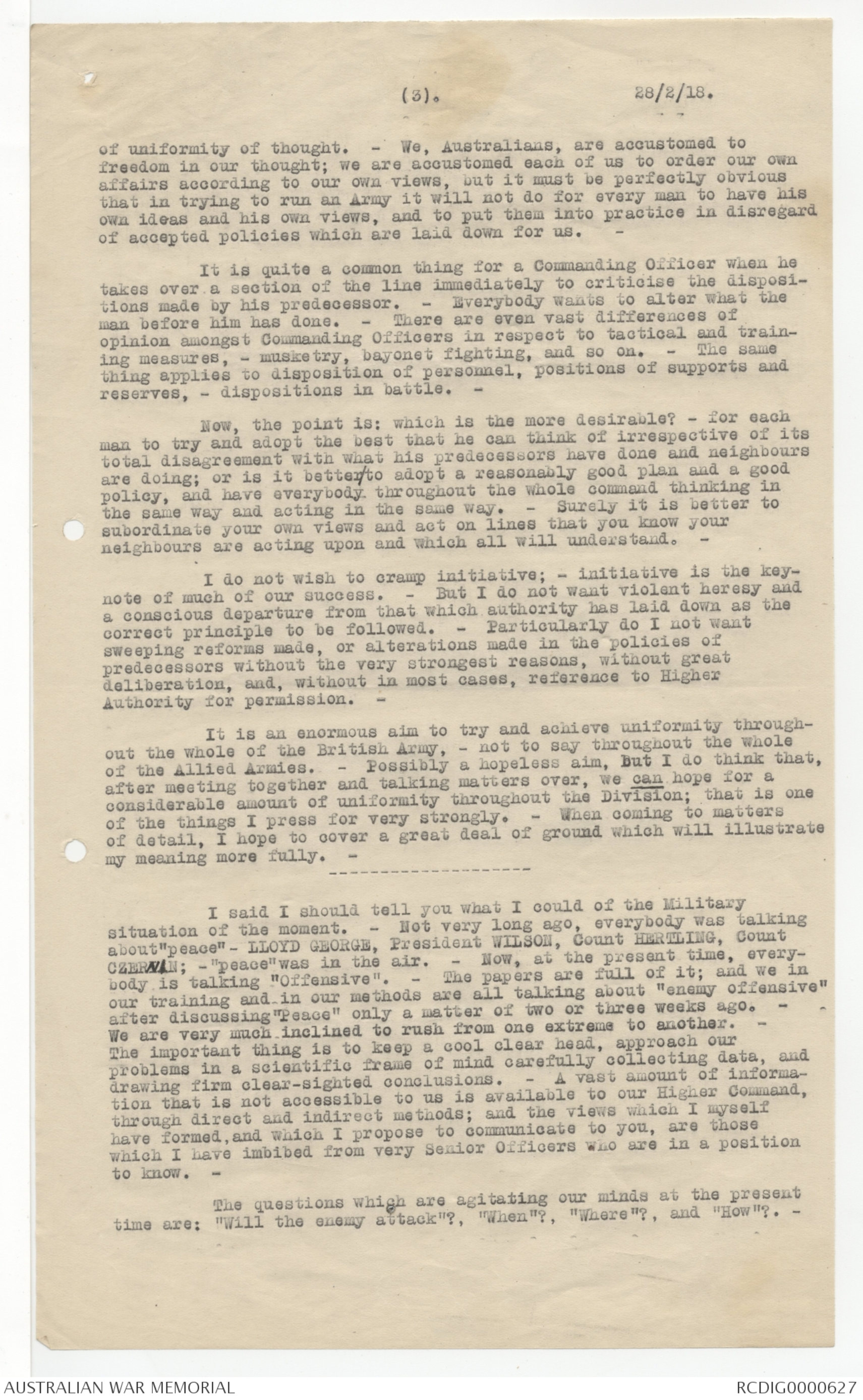
Our Defensive Arrangements
i Plans. - ii Works. - iii Tactics - iv Training
Defensive Plans
a. Proper plans of action - fully worked out - essential
down to smallest unit
promulgation to every man who is to act.
b. Prevention of Surprise - Observation - Intelligence Service
Domination of Enemy patrols - so they don't see our wire -
must be prepared to risk some men.
Keeping higher Commanders advised of
all unusual occurrences on front
Reporting enemy arty. activity. - Operation Telegram
c. Arrangements for Alarm.
d. Arrangements for Assembly of resources - in men & stores.
e.g. working parties, - other detachments.
e. Plans for Action - some definite action;
may be alternative
f. Subordinates to know their places, tasks & duties.
to reconnoitre assembly places
routes
trenches & posts
Change of Corps Policy - owing to
(a)weather
(b) military situation
i.e. Push troops forward -
to live
to work
to fight
Quote S.S.135 (supplement) page 6 top para.
Caution -
Using up Reserves & Resources
No good to ask for Reinforcements
Keep tight hold of all resources.
Works
Supreme importance of wire
prevents surprise
especially real obstacle in front line
Cambrai no analogy
Concealed wire in rear position
Marking of defences -
burning of notice boards.
Tactics
Repeat need for Uniformity of Thought.
Hence ^I touch on aspects which have, in past, involved
differences of opinion
A. Machine Guns. -
Policy - Centralization & Pooling
New Organization - See S.C. 40/99. -
Tactics - pamphlet:- [our printed G.S Circular No 68A
Conventional Signs
Infantry Commanders cannot dissociate themselves
from responsibility for siting
B. Lewis Guns
In defence - enfilade & flanking fire
In the offensive - spare guns, from carrying units
3 Categories a. with platoons
b. Consolidation } under Bn Cd.
c. Sniping )
C. Anti- Aircraft Defence
Organization
1 L.G. per Co.
1 do per F.Co
2 do per Battery
No added personnel.
A.A. Officer
each Bgde to nominate.
Training
Condemn Tracer Bullets
no need for AP.
Our Tactics S.S. 205 [
Refer also to recent S.G. 7/107.
D. The Immediate Counter Attack
Local Initiative
always inculcate it.
Apparently contradiction as to keeping
troops in hand.
but not if definitely told off for Counteratttack.
D a. the deliberate Counterattack - easier than an assault.
E Knowledge of other arms
Div. Arty.
Heavy Arty.
R.F.C.
Training.
(in new area)
A. Musketry
make best-of no facilities
C.O's help each other.
rapid firing
muscle exercises
Dummy Ammunition.
Prepare men for Mass Attacks - 1st Ypres - Cambrai.
B. Bullet and Bayonet
Platoon Competition as laid down
C. Lewis Gun
Train every man
Recent Reports
D. Sharpshooters 38th Division
Special training.
[No Div. organization
using sharpshooters during
consolidation.]
E. Signallers
40 for M.G. Bn alone
F. Platoon tactical exercises
directed to capture & recapture of objectives
G.Rifle Grenadier
& smoke grenades
H. Mobility-
(a) lighter loads
(b) decide what to dump or send to base.
(c) readiness to move
G.I.
G.I.
Lt Col Jess
to have ½¾ hr.
A.Q.
Cpt Pike to have ¾½ hr
also A.D.M.S. ¼ hr. re Venereal
Inspection of blue light hut.
Intermediate Category
P.B. men, & I
arranged by one C.O.
Cook's clothing.
Questions raised by Conference.
Conference 26/2/18 25/2/18
Start at. Timetable
a.m.
10-30. Conference opens.
10-35. Preliminary matters
10-40. Situation
11-00. Our employment
11-20. Our Defensive Arrangements
11-40. Works -
(Stop at 11.45 for ¼ hr.)
__________________________________________________________
12-00 Tactics
12-45 Training
1-45 p.m. G.1
2.30 p.m. AQ
& A.D.M.S.
3 p.m. Conference Questions
27/2/18
Lt Col Deeble - (50th Bn - 4th Div.)
[Maclagan due back March 5th]
Victoria - Geelong.
C.M.F since July 1908. under Fred Hughes
& Merrett.
Was Capt. at opening of war
got highest marks in Exam. for Capt
B.A. - Master Essendon High School.
A.I.F. 26/10/14 - having been at Fort Franklin
mobilized
Squadron Leader with 8th L.H. Rgt
Landed 20/5/15 -& there for 4 mos.on June 28
Aug 7 was in charge of N&K
then Commanded Regt.
Aug 21 - Kaijick Aghala. (Hill 60)
& then in charge of Brigade.
Sep. 22/15. Evacuated with enteric & to England.
O.C. Weymouth, Park House, & O.C. Tng Dept
Perham Downs
Feby 14/17 joined 6th Div - best in Division (69th Bn)
Oct 22/18 Div. disbanded & came to France
joined 48th & Commanded nominally. - not
in battle. Leave returned 6 wks ago trained with
50th Bn,-
[*Letter by Antill - [[Re ?]] to Corps.} Abbott - see him
General Moore: - } LtCol W.H.K. Mackenzie]
Inf. Base at Havre *]
A.H.
THIRD AUSTRALIAN DIVISION.
Divisional Headquarters,
28th. February, 1918.
NOTES OF CONFERENCE
HELD AT DIVISIONAL HEADQUARTERS (RAVELSBERG)
ON TUESDAY
26TH. FEBRUARY 1918.
---oOo---
The Divisional Commander took the Chair at 10.30 a.m.
The following were present :-
C.R.A. and B.M.R.A., Brigade Commanders and Brigade Majors,
Commanding Officers of Infantry, Pioneer Battalion, and Machine
Gun Companies, G.S.O.I., D.A.A.G. (acting for A.A. & Q.M.G.),
C.R.E., O.C. Divisional Signal Company, D.M.G.O. and A.D.M.S.
------------------------
The Divisional Commander after a few introductory remarks, said:-
It may help you in arranging your notes if I sketch out very briefly
the course of procedure at the Conference. - In the forenoon, I
propose to address you with the objects, firstly, of explaining briefly
the general military situation, then of discussing the possible employment
of the Division in various contingencies, thirdly, of our defensive
organisation and our defensive works, fourthly, of certain important
tactical question and fifthly on questions of training; - and I expect
that that will occupy the morning. - After an adjournment for lunch,
Lieut.-Colonel JESS (G.S.O.I.) will address you on tactical questions
and also on training question; and Captain PYKE (D.A.A.G.) has a number
of important Administrative matters to bring forward to Which I shall
also add some, - and I wish the A.D.M.S. also to speak. - That programme
should take us to somewhere about 3 o'clock, and the rest of the afternoon
will be devoted to dealing with question asked raised by Commanding
Officers attending this Conference. -
----------------
In regard to question of procedure, I do not think it will be
practicable to issue Divisional minutes of this Conference, because the
ground covered will be so considerable and our stenographic and typewriting
resources are so limited that I must ask you to take full notes,
or at least headings, sufficient to serve your purposes, and not wait
for anything to be issued by the Division. - As I desire to reach
all Commanding Officers personally, I trust that the seconds-in-command,
or all acting on behalf of Commanding Officers who may be absent, will
take sufficiently full notes for the use of their Commanding Officers
when they return to duty. - I also desire to say that, while the
subjects brought forward are those of importance primarily to Commanding
Officers themselves, my object really is to reach through you the whole
Division, and I want each Commander, within his own sphere of jurisdiction,
to make a special point at the earliest opportunity to call a
subordinate conference of his own officers and speak to them in adequate
detail, to whatever extent each subject demands of the various questions
raised. - In other words, the purpose of the Conference would fail if
it did not succeed in stimulating all Commanders to further activity,
and if matters discussed, dealt with and settled upon, were not passed
on to the junior ranks. - I have only two ways of reaching the personnel
of the Division: one is by means of a Conference of this nature, and the
other is by the issued of orders, instructions, staff circulars and
memos. - I often hear the remark when I travel around the Division -
and often by quite Senior Officers - that this is a "paper" war. -
(1).
(2). 26/2/1918.
This is perfectly true, but I do want you all to adopt a sympathetic
attitude towards the difficulties which are involved. - Papers
relating to mere routine do not worry Commanding Officers very much
after all, - it worries their staffs, etc., but what may and will
worry Commanding Officers is the immense amount of educative literature
that is constantly being promulgated - We must face that evil
quite squarely. - We are trying to educate an Army in the middle
of a war, and there are only two possible courses open: - either to
assemble in large bodies and have lectures delivered by experts and
qualified staffs, or else to address our personnel by means of the
printed and written word. - The first course is generally impracticable
because it involves withdrawing people from responsible duties;
and therefore the only alternative that is open to the Higher Command
is to issue educative matter in the form a printed and typewritten
circulars. - One of the most important things I wish to say is that
I plead very strongly for the most careful study of all matters that
are thus issued, - study by the Commanding Officer himself because
he is the fighting head and the source of inspiration for this whole
unit. - One has a feeling that a considerable portion of the
educative and executive matter that is issued to units is liable to
be treated with scant courtesy, - liable to be merely glanced at and
then laid aside. - What I am so anxious to achieve is complete
uniformity of thought, policy and attitude throughout the whole
Division. - I am particularly anxious that everybody should take
most seriously, translation of German documents which are frequently
capture and promulgated. - Whenever I am able to do so, I try to
secure an issue of these pamphlets in adequate numbers to enable
quite junior Officers to get them into their hands. - But where it
happens that Higher Authority can only produce for us a single copy
for a Battalion, I do expect Unit Commanders to see that the contents
of that document are adequately mastered, sympathetically studied,
carefully perused and then methodically communicated to the whole
command. - At a previous Conference in this very room some five or
six months ago, I made use of the analogy of a "leaky pipe" where the
amount of water you receive at its inlet end is only a fraction of
what pours out at the discharge end. - I think that is a very fair
analogy of the experiences in relation to the information which passed
from Higher Authority down, ultimately to the man in the ranks, -
whether the matter be executive or educative; and every day I am
impressed with the frequency with which information and instruction
"leaks" away, even weeks after issue of these matters, and after there
has been plenty of time allowed for due promulgation. - If finally
you ask a Platoon Commander about something: he says "Never been told
about it - Never heard about it". - The first condition of efficiency
in administration is to ensure that any matter issued by Higher
Authority gets through, that you do not sit down on it, do not adopt
towards it an unsympathetic attitude and say "It does not concern us",
and lay aside and disregard it. -
An aim that I, - and I am sure that all of you are most
anxious to achieve, is complete uniformity of thought and policy
throughout the Division. - I think that there is no factor that
I could mention that is so much a key-note of the German successes
as their uniformity of thought throughout their Army. - From the
earliest days of their military organisation, it is a policy they
have cultivated to the utmost, and in their wars of 1866 and 1870
the one factor that stood out as an attribute to their greatest
successes was the uniformity of thought throughout their whole Army;
and the reliance with which Subordinate Commanders could be depended
upon to do the things that was required, even in the absence of
orders. - When the situation was obscure, commanders of all grades
from the highest to the lowest could be depended upon to act in
training and regimental preparation. We cannot in a newly created
Army hope for anything like that, but we can hope for a high measure
(3). 28/2/18.
of uniformity of thought. - We, Australians, are accustomed to
freedom in our thought; we are accustomed each of us to order our own
affairs according to our own views, but it must be perfectly obvious
that in trying to run an Army it will not do for every man to have his
own ideas and his own view, and to put them into practice in disregard
of accepted policies which are laid down for us. -
It is quite a common thing for a Commanding Officer when he
takes over a section of the line immediately to criticise the dispositions
made by his predecessor. - Everybody wants to alter what the
man before him has done. - There are even vast differences of
opinion amongst Commanding Officers in respect to tactical and training
measures, - musketry, bayonet fighting, and so on. - The same
thing applies to disposition of personnel, position of supports and
reserves, - dispositions in battle. -
Now, the point is: which is the more desirable? - for each
man to try and adopt the best that he can think of irrespective of its
total disagreement with what his predecessors have done and neighbours
are doing; or is it better/to adopt a reasonably good plan and a good
policy, and have everybody throughout the whole command thinking in
the same was and acting in the same way. - Surely it is better to
subordinate your own views and act on lines that you know your
neighbours are acting upon and which all will understand. -
I do not wish to cramp initiative; - initiative is the keynote
of much of our success. - But I do not want violent heresy and
a conscious departure from that which authority has laid down as the
correct principle to be followed. - Particularly do I not want
sweeping reforms made, or alterations made in the policies of
predecessors without the very strongest reasons, without great
deliberation, and, without in most cases, reference to Higher
Authority for permission. -
It is an enormous aim to try and achieve uniformity throughout
the whole of the British Army, - not to say throughout the whole
of the Allied Armies. - Possibly a hopeless aim, but I do think that
after meeting together and talking matters over, we can hope for a
considerable amount of uniformity throughout the Division; that is one
of the things I press for very strongly. - When coming to matters
of detail, I hope to cover a great deal of ground which will illustrate
my meaning more fully. -
--------------------
I said I should tell you what I could of the Military
situation of the moment. - Not very long ago, everybody was talking
about"peace" - LLOYD GEORGE, President WILSON, Count HERTLING, Count
CZERNIN; - "peace" was in the air. - Now, at the present time, everybody
is talking "Offensive". - The papers are full of it; and we in
our training and in our methods are all talking about "enemy offensive"
after discussing "Peace" only a matter of two or three weeks ago. -
We are very much inclined to rush from one extreme to another. -
The important thing is to keep a cool clear head, approach our
problems in a scientific frame of mind carefully collecting data, and
drawing firm clear-sighted conclusions. - A vast amount of information
that is not accessible to us is available to our Higher Command,
through direct and indirect methods; and the views which I myself
have formed, and which I propose to communicate to you, are those
which I have imbibed from very Senior Officers who are in a position
to know. -
The questions which are agitating our minds at the present
time are: "Will the enemy attack"?, "When"?, "Where"?, and "How"?. -
 Loretta Corbett
Loretta CorbettThis transcription item is now locked to you for editing. To release the lock either Save your changes or Cancel.
This lock will be automatically released after 60 minutes of inactivity.